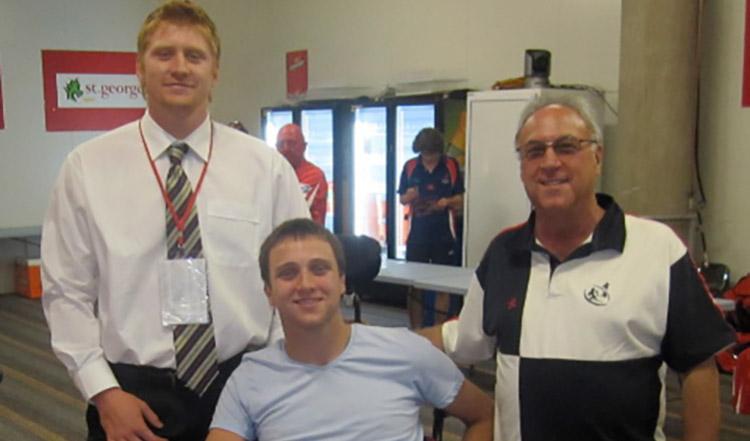
Ben Kende on Subconscious bias, empathy and NDIS
Meet Ben Kende
This can Happen to Anyone
A spinal cord injury can happen to anyone at any time and the impact reaches far beyond not being able to walk. As well as lack of movement, it means a loss of control, mental and physical wellbeing, independence and freedom.
15,000 people across Australia live with the debilitating effects of a spinal cord injury. Sufferers are most likely to be male and aged between 18-24 years of age.
Ben Kende is one of those thousands of people. In 2010, the talented athlete was rendered a wheelchair bound quadriplegic after a freak rugby accident in Thailand. A challenging time followed, as he was forced to endure relentless physical and mental battles.
Nine years on, life is pretty good for Ben. The 27-year-old is a Graduate at law firm Norton Rose Fulbright and lives in Surry Hills with his two roommates. He goes to the gym twice a week and gets to the rugby or AFL as often as he can. He also indulges in the popular Aussie past times of going to the beach and knocking around with his mates at the pub.
Ben kindly took the time to chat to the Office of the Premier and Cabinet, to provide a first-hand account of what life is like with a spinal cord injury.
What’s been the biggest challenge for you, in terms of adjusting to life with a spinal cord injury?
My injury was nine years ago, so life is very normal now but it’s been a gradual process. There have been a few milestones that have crystallised the experience, such as living abroad and meeting people in a completely new context – people who didn’t know me before my accident. Initially though, after being a very active person, having to be sedentary was the biggest struggle.
What’s been your experience with the NDIS?
I’ve been a self-managed participant since 2017 and in some ways it’s been really good. I’ve been able to hire carers who are compatible with my personality. I’ve got one full-time carer and others on various, casual contracts, so it’s pretty comprehensive.
My biggest criticism is that the experience lacks consistency and often feels disjointed. It feels as though every touch point with the NDIS is riddled with bureaucracy and it’s extremely time consuming.
How would you rate community attitudes towards people with disability in Australia?
I’ve travelled a fair bit since my injury and have to say Australia as a nation compares really well to other countries. For example, when flying on an Australian airline, the flight attendants will always address me – whereas on some international airlines, they will address my travel companion instead and won’t speak to me directly.
There is a subconscious bias that exists but really, it depends on the individual – some people are great and treat you like everyone else and some people don’t know how to react. Unfortunately there is no silver bullet, the only way to improve attitudes is by exposure.
How important is it to have people with disability in visible roles in the community?
It’s so important because you don’t see that many people in wheelchairs as public figures. I’ve had quite a few interactions with Mark Tonga, the Chair of the NSW Disability Council. He’s a great guy and heavily involved in the policy space.
Dylan Alcott is also a big inspiration – he’s an incredible athlete and has now forged a career in the entertainment industry, which is amazing. We need more representation like this in the community, especially for the willing and able part of the disability community.
You created your own foundation, what does it try and achieve?
We created the Ben Kende Foundation in early 2011. Our remit has changed over the years but is now aimed at showcasing the very full lives people can lead in a wheelchair and attempting to change perceptions about disability.
Another major goal is to raise funding for research; at the moment we’re raising money for an exciting project on electrical simulation, which is a global project being pushed out of the US. We’re also in partnership with a UK organisation called Spinal Research, which has started a new initiative called Tackling Paralysis.
As a final thought, what’s your message for those in the community without a disability?
It could easily be you in this position. It’s a basic idea but be empathetic – treat that person how you would want to be treated.
Watch the interview with Ben and Peter Overton from Channel 9, while Ben was receiving treatment at Royal Rehab in Sydney.



